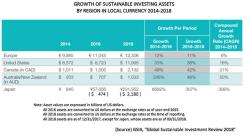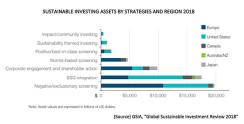In March 2019, the Financial Services Agency of Japan appointed Satoshi Ikeda its first Chief Sustainable Finance Officer. The newly created position oversees initiatives addressing social and other issues from a financial perspective, as well as green bonds and other forms of green finance. In this interview, Ikeda explains the unique attributes of Japanese ESG investment.

“ESG investment in Japan has rapidly expanded since 2015 when Japan’s Government Pension Investment Fund (GPIF) signed the Principles for Responsible Investment (PRI). By 2018, it had grown 300% annually since 2015.”

“Japanese ESG investment strategies differ somewhat from those of other developed countries, which is one reason Japan was slow to embrace ESG investment. If you rank ESG investment strategies worldwide, the most common is negative screening. In other words, the most frequently applied strategy in Europe and the U.S. is to exclude companies or industries that do not comply with specific pre-set social or environmental criteria, but it is notably rare in Japan. That sort of divestment culture does not sit well with Japanese investors.”
“Instead, most Japanese institutional investors prefer to integrate ESG factors into the investment process or engaging with companies to achieve ESG goals. The dominance of these two ESG investment strategies is quite unique to Japan. ESG integration and engagement tend to have a more positive association, which is likely favored by Japanese institutional investors.”
“Integration embeds ESG factors into the assessment of corporate value, and engagement promotes constructive dialogue based on ESG factors to enhance corporate value. Integration and engagement are essential to fulfilling the fiduciary duty in ESG investment but also entail very challenging tasks. Both require a deep understanding of investee companies and an in-depth knowledge of their ESG issues. Solving ESG issues can improve corporate value of an investee company. But actively engaging with companies to enhance corporate value takes more time than merely omitting those associated with a certain business or product. In my view, this is why ESG investment required more time to take root in Japan.”

“With the enactment and subsequent revisions of Japan’s Stewardship Code and Corporate Governance Code, the Financial Services Agency of Japan (JFSA) has been driving corporate government reform in Japan. At the same time, reform of the investment chain of asset owners, asset managers, and investee companies is taken in parallel with corporate governance reform.”
“Reforming the investment chain means encouraging and facilitating constructive dialogue among them, which leads to enhanced corporate value, and which ultimately creates a virtuous circle for the entire economy. In this context, engagement is considered the key to enhancing corporate value. It has been seven years since the first enactment of Japan’s Stewardship Code in 2014, and it is no coincidence that we now find strong growth in ESG investment in Japan through increased ESG integration and ESG-themed engagement.”
“JFSA released the 2nd revision of the Stewardship Code in March 2020. With this revision, the Code is extended to cover not only listed stocks, but all asset classes, insofar as stewardship activities are relevant. The revision also clarifies that consideration of sustainability, including ESG factors, is an integral part of stewardship responsibilities under the Code.”
“In light of these changes, I anticipate 2021 will be a pivotal year for Japanese asset owners to consider how ESG factors enhance corporate value of investee companies and how to encourage investee companies to enhance corporate value. In this regard, the Covid-19 pandemic continues to pose a difficult question: How should companies prepare for such ESG risks that may rarely occur but will have a huge impact on sustainable growth if they do?”






